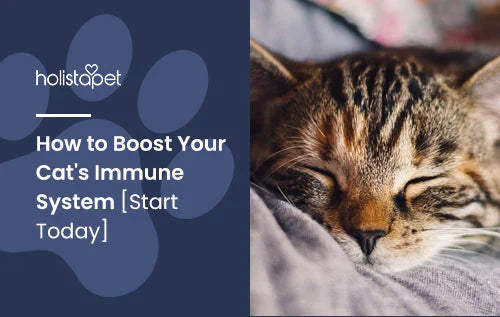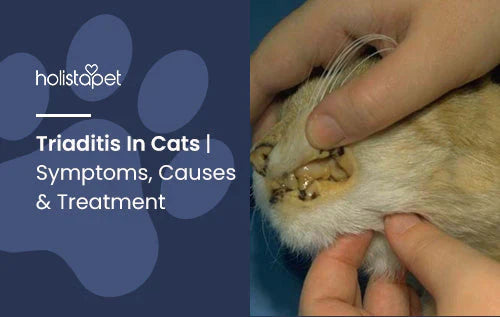It's funny how we think about our immune systems almost daily, while we often only ponder about our cat's when something is wrong. For the most part, we understand that things like processed foods, inactivity, and a poor diet can compromise the immune system. Yet, we feed our pets highly processed foods, allow them to be lazy, and treat them to unhealthy snacks. Now that we are aware of unhealthy choices we are set on fixing the situation. So what can we do for a cat's immune system? For cat owners, boosting the immune system is essential for longevity. Additionally, it is important to understand how your cat's immune system works and what affects it.
Cat Immune System
Much like humans, a cat's immune system is a complex network of blood cells, organs, and antibodies made for defending the body. Toxins, parasites, infections, bacteria, viruses, and other foreign organisms can hurt or kill your cat. Luckily, the immune system helps to stop these invaders before they can do harm. The immune system communicates with itself to create a proactive and reactive defense against ailments. Your cat's immune system is part of a bigger scheme called the lymphatic system.
Your cat’s lymphatic system is responsible for the transport of lymph and many immune system functions. The lymphatic system is comprised of lymph nodes, which exists all throughout your cat's body. Major organs in the lymphatic system include bone marrow, spleen, and thymus. Lymphatic tissue is also integral to your cat's gastrointestinal (GI) tract.
What Affects a Cat's Immune System?
A cat's immune system can be impacted by a number of factors including diet, stress, inactivity, genetics, and environment. Often, a combination of two or more of these factors can devastate your furry feline's immune system.
Stress tends to be the main cause of immune system maladies in cats. Although your pet may not show it, circumstances such as meeting new pets, relocating, meeting strangers, horrible weather, separation fear, or loud noises can cause your cat to become stressed. Some cats may suffer from chronic stress if they survived traumatic experiences.
Stress in cats can also come from a lack of activities or physical exercise. As we know cats are naturally curious if a cat has nothing to do it can become anxious. If the cat's anxiety is persistent it often leads to stress. As we now know, stress degrades the immune strength of cats.
Other than stress, immunodeficiency can weaken your pet's immune system. Immunodeficiency is defined as a failure of the immune system to protect the body adequately from infection, due to the absence or insufficiency of some component process or substance. While some cats may develop immunodeficiencies in their life, others can be born with them.
Lastly, a poor diet can cause the immune system to weaken. We should all know that bad food is horrible for cats. Just like in humans, not eating or getting the proper nutrients may lead to immunity deficiencies in cats. Consequently, if a cat has trouble eating or does not have access to the proper nutrition it's immune system may struggle to keep up and the cat's body will be weak.
How to Boost Your Cat's Immune System
Provide a Healthy & Nutritious Diet
Boosting the immune system is easy, as long as you have the right information. Your cat's diet will be the most important factor in boosting their immune system.
Highly processed pet food barely contains any nutritional value at all. Food coloring and other additives don't help the situation either! If you have been feeding your pet unhealthy food every day, you are slowly damaging your fluffy friend's immune system.
The best way to immediately create a positive impact on your pet's immune system is to improve the diet. Swap out highly processed pet food for more organic or natural feed. Although cats may seem less interested in the sweet taste of fruits than dogs, feeding your furry friend some fruit can help their overall health. Apples, bananas, blueberries, cantaloupe, strawberries, and seedless watermelon are all safe for your cat to ingest and may help boost the immune system.

Provide Adequate Exercise & Playtime Activities
Besides the diet, exercise may help boost the immune system as well. A sedentary lifestyle can cause your cat's immune system to deteriorate.
Exercise and playtime are essential for a cat's body and mind to remain healthy. Physical activity helps reduce stress, this allows the immune system to function at a higher capacity. Exercise also ties into your pet's weight.
Monitor & Govern Body Weight
Being overweight or obese can be very detrimental to your cat’s health. Overweight animals are more likely to develop chronic diseases and infections. On the other hand, malnourished cats or cats that refuse to eat might also be at risk of developing health issues. If your feline is hard to feed, you may want to look into ways to stimulate a cat's appetite.
Combining a healthy diet with regular excise will do wonders for the overall wellness of your cat. When many owners think of exercise, they get anxious. They believe exercise means completing strenuous tasks, but there are actually many cat activities that promote playtime and exercise.
Vitamins & Supplements
Of course, outside of diet and exercise, there are several vitamins and supplements that may help boost your cat's immune system. There are numerous multivitamins and supplements available at pet stores across the nation. Antioxidants are also amazing for animal health. They fight oxidative stress, which damages cells and hurts the immune system.
Oxidative stress is an irregularity between free radicals and antioxidants in your cat's body. Oxidative stress in your cat can be caused by obesity, poor diet, pollution, and exposure to harmful substances like pesticides or radiation. Antioxidants create a balance by interacting with free radicals and stopping them from completing chain reactions that damage the body.
Antioxidants
The most popular antioxidants are vitamins A, C, and E. Using vitamin A helps regulate the immune stems by assisting with the creation of white blood cells. Vitamin C is essential when it comes to fighting free radicals because it neutralizes them. Vitamin E is also amazing at battling free radicals by limiting their production.
Combined, these vitamins also help with skin and coat health, assist with night vision, repair broken bones, heals wounds, battle parasites, and much more. It is essential that your cat is getting a healthy portion of vitamins A, C, and E daily.
Herbs
There are many herbs that provide cats with healing properties. The most popular are green tea, curcumin (from turmeric root), and Cat's Claw. Green tea contains polyphenols that assist with the elimination of free radicals. It also maintains the production of a protein that preserves healthy cells. Curcumin is widely known for providing potent antioxidants and anti-inflammatory qualities. Both green tea and curcumin also have cancer preventative properties.
Cat’s Claw comes from a vine found in the tropical jungles of South and Central America. It has very powerful antioxidant properties and is praised for its ability to fight off several illnesses and digestive issues.

CBD
All mammals have an endocannabinoid system, which is comprised of CB-1 and CB-2 receptors. The CB-1 receptors are mainly connected to brain activity while the CB-2 receptors are largely found in the immune system. The endocannabinoid system (ECS) regulates several important functions such as inflammation, mood, sleep, soreness, and more. Because of this, the ECS is essential in maintaining a healthy body.
CBD is a highly beneficial cannabinoid found only in cannabis. It is commonly added to cat products like CBD cat treats. Many people associate cannabis with THC, the psychoactive cannabinoid in cannabis. THC interacts with the ECS but also leaves users with psychoactive feelings. CBD does not contain any psychoactive properties, but can still help influence the ECS. By interacting with your cat's ECS, CBD may generate homeostasis and promote overall wellness.
Final Thoughts
It is important to protect and maintain the overall wellness of your cat. The key to this is making sure your cat's immune system is healthy. Cut out highly processed foods and replace them with organic feed and healthy snacks like fruit. Antioxidants, herbs, and CBD may also be implemented to promote overall wellness as well.
Before adding any new supplements to your pet's diet, owners should speak to their vet. Just because your furry friend looks healthy on the outside, that doesn't mean everything on the inside is going according to plan. Weight regulation and daily exercise are also integral to your cat's longevity. If you love your pet, like we know you do, there's no reason not to take steps to make sure they lead a healthy and happy life. View more info here.


 CBD Oil for Cats - Fast Acting
CBD Oil for Cats - Fast Acting
 CBD Cat Treats - Easy Dose
CBD Cat Treats - Easy Dose
 CBD Calming Chews for Cats - Highly Rated
CBD Calming Chews for Cats - Highly Rated
 CBG Oil for Dogs and Cats - Loved by Thousands
CBG Oil for Dogs and Cats - Loved by Thousands




Leave a comment
All comments are moderated before being published.
This site is protected by hCaptcha and the hCaptcha Privacy Policy and Terms of Service apply.